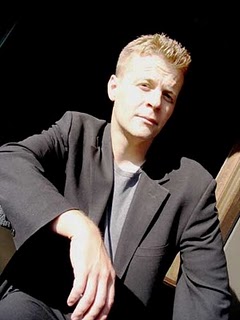Christian Bok
Retelling the Illiad with the letter E
In 2005, a seminar of Penn students and Charles Bernstein spoke with Christian Bok, making a recording that is now part of the "Close Listening" series hosted by Bernstein. Here is the recording and here is more information about the session. Now Michael Nardone has transcribed the interview for later publication in Jacket2 but we cannot resist offering a brief excerpt here:
- -
 PENN STUDENT:
PENN STUDENT:
So, while we are talking about Eunoia, can we look forward to a consonant sequel?
BÖK:
A consonant sequel? No, I’ve promised myself that I won’t ever write another constraint-based book again. The blood-pact I have with my peer group is that every book we write will be radically different from its predecessor, that the entire oeuvre should be completely heteroclite. So, the next project requires learning a whole new skill-set and re-training my brain, in effect, to learn something else. I probably would not have the endurance now or perseverance required to actually finish a constraint-based book.
PENN STUDENT:
So, clearly, this is very constraint-based, and from what you’re saying, you’re probably going to set yourself a new set of rules every time you write something new. So, are you arguing for something, for going back to sort of the poetic formality that has existed forever, against the tide of free verse, or stream-of-consciousness?
BÖK:
Well, actually, I have no problem with those poetic forms. I think my only complaint about those poetic forms you’ve cited is that they are not feeling much incentive to innovate and produce something new and reinvent themselves in a manner which is exciting and stimulating. And to me, it’s not so important that the work actually demonstrate some sort of formalistic character, so long as it has some kind of innovative rationale for its practice. So, I’m not making a case, I think, for a return to rigorous and strict formality. You know, I’m not that fascistic or school-marmish, I think, in my sensibilities. But I did this project thinking that it was a kind of experimental work. I didn’t know if it could be done, and I merely conducted the experiment to see what would happen. And to me, that’s really what writing poetry is about, it’s a kind of heuristic activity where you indulge in a completely exploratory adventure through language itself.
PENN STUDENT:
Well, speaking of innovative rationale, where did your constraints, your content constraints about, you know, the nautical voyage and so forth, come from?
BÖK:
Okay, in the book, the five chapters have a thematic thread, which runs throughout the entire book. Every chapter has to allude to the art of writing. All the chapters have to describe a culinary banquet, a prurient debauch, pastoral tableaux, and a nautical voyage. These four scenarios are indicative of a vocabulary that’s common to all five vowels. It’s possible to say something erotic or culinary in theme in all the vowels cause they actually have that vocabulary common to all of them. So, I wanted there to be sort of thematic consistency across the entire book. I didn’t want it to be just five separate, individual stories that had no correlations with each other. I wanted there to be some sort of thematic parallelism, and it just so happened that these were the lexicons that were common to the five vowels. So, included them in the story.
Now, coincidentally, those four scenarios are, in fact, the kinds of scenarios you typically see in Greek epic poetry. And, for me, the word eunoia, which is originally from Greek, means quite literally “good-will”—it was a term coined by Aristotle to describe the frame of mind that you have to be in in order to make a friend—it seems to me it reflects a kind of neo-classical set of values about beautiful thinking. And certainly, there is a kind of classical story in there. The re-telling of the Iliad in chapter E, I think, alludes, in fact, to these kinds of four scenarios, which are common to a classical form of story telling. You would find these scenes in that.
PENN STUDENT:
So, did the classical idea come first, because when I read the nautical voyage, it reminded me of, sort of, epic, the epic tradition? So, did the research for what was common come first, or sort of a homage to the classical traditions?
BÖK:
It’s all a side effect of the actual vocabulary itself. It wasn’t as though I planned to write about these four scenarios. The vocabulary determined, in effect, what it was possible for me to say, and I simply said it. It just so happens that, I think, coincidentally, they are easily integrated into this rationale, this explanation, you know, that it has something to do with, I think, a kind of neo-classical, kind of Apollonian rigor or, you know, aesthetic value that I think the Greeks exemplify.
PENN STUDENT:
Okay, my final question: have you ever thought of joining an acapella group?
BÖK:
No, I don’t think so. I don’t think I would join an acapella group. I’m too much of an auteur.
I have no vocal training. I’m not a musician.
BERNSTEIN:
You know, I always thought Eunoia was what people said about poetry like ours: You annoy-a me.
BÖK:
That’s right, that’s right. That was the standard joke my friends when the book was out wearing its welcome, people would describe it as Annoy-you, or, better yet, Ennui.